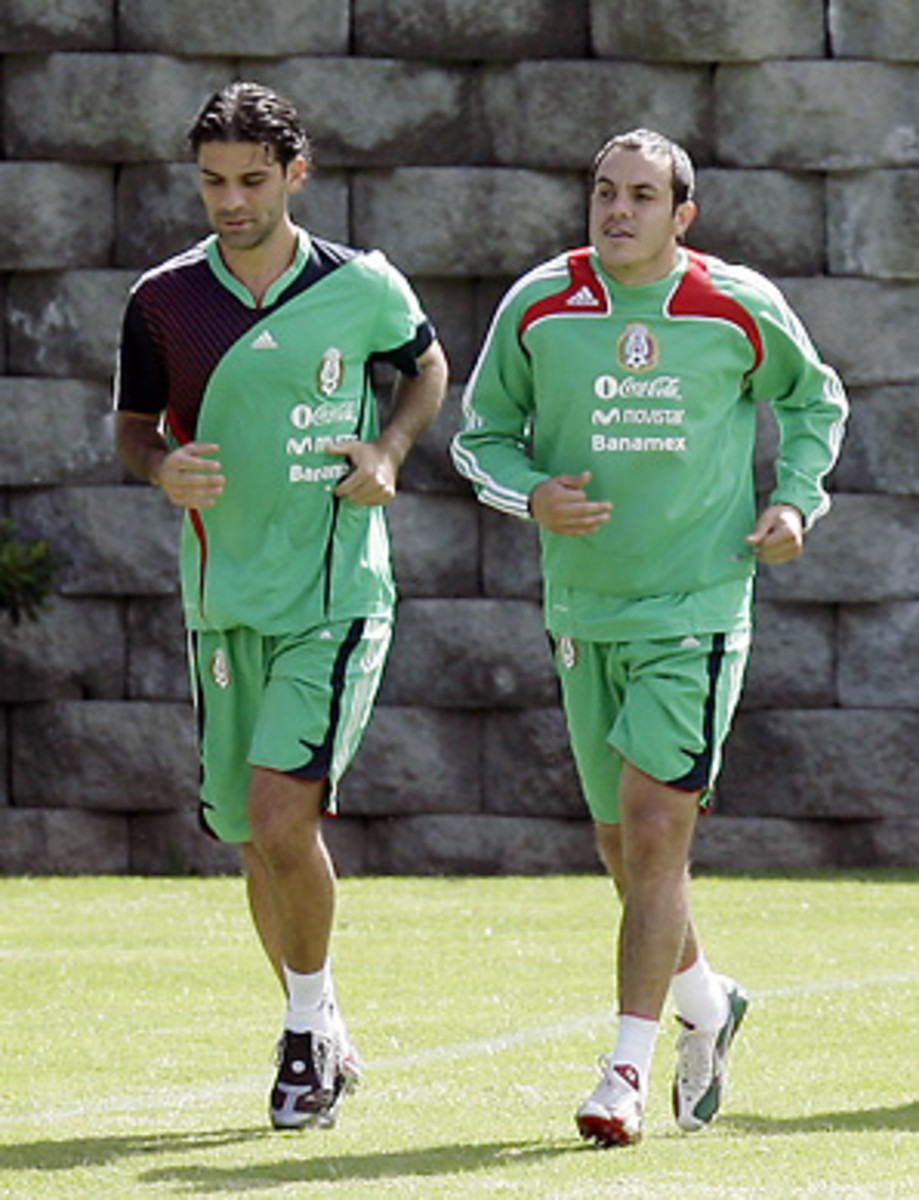
Mexico's turnaround not done yet
Mexico is back, or so the Hexagonal table says. El Tri needs just one win to get into South Africa 2010 and complete its remarkable comeback. A win over El Salvador on Saturday (6 p.m. ET, Telemundo), combined with other results, could catapult Mexico into first place, and it could remain there until the final round of CONCACAF qualifying ends on Oct. 14.
But Mexico, believe it or not, has much to prove against the Salvadorans. This game might not appear tough -- El Salvador's last three qualifiers in Mexico resulted in losses of 4-1, 5-0 and 3-1 -- and Mexico's win might appear to be nothing but a slam dunk.
Still, before the Mexicans officially secure a spot in next summer's World Cup, they must continue evolving and get past a few more challenges.
Rafael Márquez hasn't even played 90 minutes for Mexico during the Hexagonal. The team's longtime captain acted nothing like the gaffer when he was red-carded against the U.S. back in February, his only action this round. When he was sent off, Mexico was nearing its low point. That 2-0 loss in Columbus, Ohio, was followed up by a 2-0 win over Costa Rica, but Honduras then slammed Mexico 3-1 and El Tri hit rock bottom.
Javier Aguirre took over in April, and the team's rise to prominence began during the CONCACAF Gold Cup. Instead of Márquez anchoring the defense, other veterans have picked up the slack. Carlos Salcido and Ricardo Osorio have shown well in the back line, while Jonny Magallón also has been solid when called upon. Efraín Juárez has been a revelation on the right while JoséAntonio"Gringo" Castro and Óscar Rojas also have performed when asked.
Thanks to them, the defense suddenly has proven to be the team's deepest position. Márquez could have retired last month and Mexico wouldn't even have noticed. Still, a player with the talent and experience of Márquez, "el Kaiser de Michoacán," surely has a place among the team.
But where? Should he start and risk causing a disruption in an otherwise stable unit, no matter how talented he is? Talent alone does not win, and Aguirre's predecessor, Sven-Göran Eriksson, found out as much. Márquez was a fixture under Eriksson and Mexico was in terrible shape for months. Márquez also was an unquestionable starter and captain under Hugo Sánchez, and he was also fired.
With players such as Pável Pardo, Antonio "Zinha" Naelson and OswaldoSánchez no longer part of El Tri, the squad has lost some talented and experienced World Cup veterans and hasn't skipped a beat. Márquez needs to show he has more to offer than his departed Tricolor teammates and earn a spot back on the team. Aguirre hasn't simply handed out starting spots, and likely won't do the same with Márquez.
Arguably the three most important players in Mexico's turnaround have been Gerardo Torrado, Giovani dos Santos and Cuauhtémoc Blanco. Torrado's tough-as-nails presence in the midfield has helped solidify that part of the field, while dos Santos and Blanco have contributed with clutch goals and strong offensive performances.
Dos Santos and Blanco are both out, though, and won't be able to see the task through. If Mexico secures a spot in the World Cup, whether it's at home against El Salvador or in Port of Spain against Trinidad and Tobago, neither Blanco nor dos Santos will be around to help get the team there.
Enter who? Somebody needs to step into their offensive roles left vacant. Can Guillermo Franco provide offense without dos Santos serving up passes? How about Miguel Sabah? Will he once again provide late-game dramatics at home? Does recent call-up Francisco Palencia really have anything to offer at age 36, other than the intangible off-the-field stuff?
One wild card could be Carlos Vela. If he hadn't gotten hurt in the Gold Cup opener, the Arsenal starlet could have blossomed into a true national-team standout alongside dos Santos. Instead, Vela isn't quite as important to El Tri -- not yet, anyway. Can he be? Sure, but he has yet to put together a string of consistent performances as dos Santos has over the past few months.
Torrado, on the other hand, will be back after missing Mexico's 1-0 win over Honduras last month due to suspension, but someone needs to be the linchpin on the attack.
Mexico has won all four of its World Cup qualifiers played in Estadio Azteca, but the last three were all one-goal victories. El Tri put in a pedestrian-like performance in a 2-1 win over Trinidad on June 10 and needed late goals to beat the U.S. in August and Honduras on Sept. 9.
Mexico hasn't been dominant yet. There has been no convincing, tear-them-apart, Mexico-is-in-a-class-of-its-own rout that the team used to put on in days gone by. Even in 2001, when Mexico struggled to qualify for the World Cup, it won a home qualifier by four goals. Sure, Mexico beat Costa Rica by three goals at Estadio Saprissa, but that game was a contest until midway through the second half.
Mexico could punctuate its rise from fifth place to a berth at the World Cup by dropping a four- or five-goal rout on El Salvador. Such would be a perfect ending to Mexico's climb back to the top of the region. Then, there really would be no doubt who the Kings of CONCACAF are.





